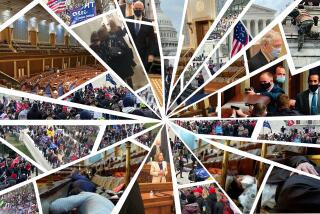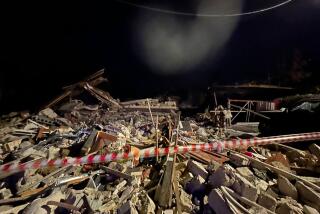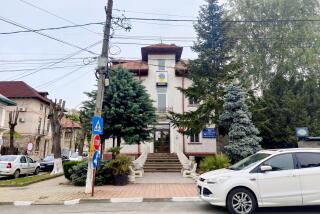New Protests Test Regime in Romania
BUCHAREST, Romania — President Ion Iliescu has instituted mob rule in the Romanian capital and created a new haven for the former Securitate secret police who terrorized the nation under the late dictator Nicolae Ceausescu, intellectuals warned on the eve of Iliescu’s inauguration.
About 2,000 people returned to University Square late Sunday, rekindling an anti-government protest that was routed from the site last week. Several hundred kept up a steady chant of “Down with Iliescu!” and “Down with the criminals!”
The initial outbursts by a handful of daring students prompted fist fights with government supporters and made clear that the population remains deeply divided against itself.
Romanians fearful of what they see as a choice between a new dictatorship or civil war said the nation’s only hope for stability is continued foreign pressure for democratic change.
Iliescu’s image and the state of reform in Romania were dealt staggering blows by violence that ensued last week after the president summoned a rampaging hoard of miners to Bucharest to crush an uprising that Iliescu claimed was incited by “right-wing extremists” with foreign support.
The miners indiscriminately clubbed pedestrians at University Square, where an anti-government demonstration was staged for 53 days, and set up roadblocks at major intersections to check the documents of all who passed through, hauling away and beating anyone suspected of having taken part in or encouraged the protest.
Targets of the rampage that left six dead and at least 500 injured said that Iliescu’s resorting to brutality to crush an uprising they fear was fueled by the Securitate has shown the new president to be at best a leader prone to panic and at worst a new despot backed by twisted remnants of Ceausescu’s regime.
Although the miners withdrew after the government appealed for them to leave the capital Friday evening, those they hunted down worry that the ungovernable force could be called back at any time. They also contend that other supporters of Iliescu have taken on the cause of repressing students, intellectuals and all those associated with the anti-Communist movement.
Angry arguments have broken out repeatedly on streets and sidewalks between rabid pro- and anti-government citizens. Police and soldiers, who have been patrolling Bucharest in force since the miners left, broke up the resulting fist fights between Iliescu backers and anti-Communists, often by taking the latter to police vans or to police headquarters.
When a small crowd of demonstrators began chanting at University Square around 6 p.m., troops formed into columns nearby but made no move to break up the protest. The crowd swelled through the evening, eventually cutting off traffic on Nicolae Balcescu Boulevard.
In addition to students and intellectuals, the miners targeted Bucharest’s Gypsy population, illegal money-changers and “criminal elements” the government accused of disorderly conduct before the crackdown.
Gypsies and money-changers who previously flocked around hotels frequented by Westerners have gone underground to escape the wrath of government supporters.
“The Gypsies were beaten by the miners, and they will seek revenge,” said one Bucharest intellectual, who, like most citizens distrustful of the government, did not want his name used. He contended that the threat of civil war has intensified since last week’s violence.
A successful professional with ties to the military, he said that Iliescu’s decision to create a new national guard to handle civil disorders is a facade to harbor the Securitate force that is regaining control of the government.
“Now that Iliescu is legitimate, because he was elected, we will have a Mafia that is an official force,” a woman engineer commented bitterly.
Iliescu criticized police and army troops for failing to contain Wednesday’s rioting and announced Friday that he plans to muster a new civil defense force he can trust to respond in future crises.
Stefan-Augustin Doinas, head of the Romanian Writers Union, said in an interview that the events of last week signal a return to rule by repression.
“The Ceausescu model of leadership is very near, and it’s impossible for him not to reach for it,” Doinas said of Iliescu, whom he has known for 12 years and previously considered a reformer.
The president has been taken in by power-hungry opportunists in the National Salvation Front, which has driven away more moderate former Communists and true reformers who feel they can do nothing to stop the return of dictatorship, Doinas said.
“The government will create a new gendarmerie to include the old nomenklatura of the Securitate to create quiet,” Doinas said. “But it will be a Communist-style silence.”
Iliescu has allowed himself to be manipulated by the Securitate, Doinas said, “and as a consequence the democratic process has stopped. We have returned to a standard Communist mentality.”
The first signs of renewed secret police activities are already palpable in Bucharest. Sources warned foreign journalists that their telephones are tapped, and in at least one case a plainclothesman appeared to be tailing an American correspondent.
Last week’s explosion of violence also unleashed a new mood of intolerance among government supporters, which has heightened feelings of vulnerability among those who disagree with the masses.
“I saw unbelievable scenes in the streets--miners beating an old woman bloody and stomping onher,” said one of the intellectuals interviewed. “I whispered to myself, ‘Beasts,’ and two women who heard began screaming at me that I was the beast--just for disagreeing with the mob’s tactics.”
“Ceausescu sought to create a new man, a uniquely Romanian man, and I fear that he succeeded,” said one woman, describing the oppressive atmosphere for the nation’s small community of educated professionals.
They worry that today’s swearing-in ceremony in Parliament will serve to legitimize Iliescu and the front government in the eyes of the Western world, and they praised U.S. and West European sanctions depriving the new government of aid or special trade status. The opening session of the two-chamber Parliament should have been a cause for celebrating progress for the multi-party democracy. But the miners’ destruction of the headquarters of both major opposition parties has further undermined the weak political minorities.
More to Read
Sign up for Essential California
The most important California stories and recommendations in your inbox every morning.
You may occasionally receive promotional content from the Los Angeles Times.











